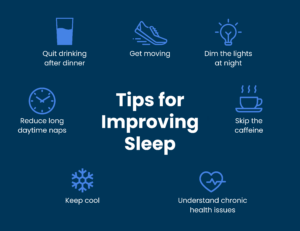Sleeping is one of the best ways for a person to recuperate from any ailments or straining activities, be it a workout or the stresses of day-to-day life. Many people believe sleep to be a period of rest, but in fact, it is so much more; it is that transition when the body, and mind, works to repair, recover and gather the energy required to face challenges ahead. This is the reason, why healing from an illness, workout or daily struggles is incomplete without sleep.
The Recovery Process While Asleep
To put it in simpler terms, a person’s body prepares itself to be in a restorative phase while sleeping. This is especially crucial after engaging in strenuous exercises and movements. When a person goes through deeper levels of sleep, many essential processes take place which are vital for healing. While sleeping, a person’s body releases growth hormones which are very useful for tissue repair. Since NREM is the deepest a person can be in without moving their eyes, this only highlights the importance of sleep. And this is why, it is important for an athlete, or anyone who engages in rigorous activities, to sleep as it garners a much fuller recovery.
The immune system also operates optimally as the body gets sufficient rest. To provide protection against infection and inflammation, the body generates cytokines while it is dosed off. This suggests that having sufficient adequate rest aids the body in fighting off sickness and recovering from physical injuries. However, if a person is sleep deprived, these aforementioned processes are compromised, thus, increasing the recovery span and intensifying the body’s risks to more illness.
Physiological and Psychological Rest
Rest is not just the rebuilding of the body’s physical elements. The brain, much like the body, needs time to recuperate and to get rid of the toxins that have accumulated in the body. Sleep is an essential component in physical rehabilitation since the body has to retain new information or process feelings. During one’s sleep, information is categorized, which helps augment the possibilities of recalling that information and the learning process, because the brain has gone through the last stages of organizing that piece of data. It is known that being deprived of sleep limits the capacity of the brain, which narrows down capability to concentrate, arrive at solutions and make sound judgments.
Moreover, sleep assists in improving modulation and emotional status. Contrary to this, lack of sleep is in many ways correlated to elevation in stress, anxiety and even depression. One reason for this is that those who sleep sufficiently and of good quality score higher on mental and emotional operations. Sleep allows for time when the difficulty of regulating emotions is taken away and the brain has a chance to rest in preparation for the next day.
The Importance of Sleep Stages
People tend to assume that all sleeping is the same which is wrong. Sleep comes in cycles with each of the cycles lasting approximately ninety minutes with light sleep and deep sleep stages interspersed in between. The deeper phase of sleep that includes slow-wave sleep (SWS) and rapid eye movement (REM) sleep is perhaps the most important for one’s recovery. SWS is related to physical recuperation, while the REM phase to mental rejuvenation and feeling. Missing any of the phases can affect your overall recuperation both mentally and physically as they are all essential for a complete recovery.
It’s not only about the duration of your slumber but also the quality of sleep that matters. Often, internal and external factors affect sleep cycles. This can cause feeling sluggish the next day as the body has not fully recovered. Sleeping better, consistently waking up and going to bed at the same time can help avoid the feeling of grogginess.
Sleep and Stress Management
Stress is a crucial factor for a lot of people since it affects physical and mental health. Sleep has been noted to be beneficial for stress and helps in keeping cortisol levels in check. However, lack of sleep only increases cortisol levels which can severely cause loss of muscle gains and several negative effects.
more than anything the body needs to adequately rest and recover to manage stress levels. This means that sleep is necessary to lower cortisol secretion and increase one’s ability to cope with stress. When someone sleeps, he or she would be enhancing his or her body’s capacity to deal with stress in the future, both psychological and physical.
Sleep Along with Hormone Regulation
In general, hormones are pivotal during the recovery period. During sleep, we can manipulate several hormones which range from those which govern metabolism to those which control various other immune systems within the body. For example, it has been demonstrated that sleep influences insulin secretion, a hormone which maintains blood glucose levels. Lack of sleep can in fact lead to a metabolic condition which is more commonly known as insulin resistance, and in turn might exacerbate other health ailments including type 2 diabetes.
In addition, sleep alters the concentration of other vital hormones such as cortisol, testosterone and leptin. Androgen, which promotes the development and repair of muscle tissues, is produced in large quantities during sleeping. Chronic sleep deprivation can negatively affect testosterone secretion, thus slowing down muscle recovery and growth. Besides, it makes leptin more active, which is a hormone that regulates food intake. This is dangerous especially for athletes because sleepless nights cause an increase in appetite, especially for junk food, which impacts performance and recovery.
The Connection Between Sleep and Recovery from Injuries.
When recovering from injuries, it suffices to say that sleep is important. A lack of sleep can slow down the recovery process since sleep enhances tissue reparation and reduces inflammation. Growth factors, for instance, are released by the body and they help in repairing damaged tissues. This is crucial especially for athletes or even those who have undergone physical trauma. Sufficient sleep enables the body to effectively repair and rebuild tissues, thus promoting an expeditious recovery process.
As well, sleep is critical in pain modulation mechanism. A well-rested individual and a sleep-deprived person in most cases will experience pain with different severity. Thus, sleep is an important parameter in psychophysical rehabilitation as it aids in relieving the sensation of pain and also assists in the healing of tissue of the body.
The Bottom Line on Sleep and Recovery
In general, sleep is not a privilege, but an invaluable part during the recovery period. Simply put it, sleep earns the body and the mind some pd. in almost all physical developments including growth in height and muscle mass. After suffering an injury, illness, or stress, making a conscious effort to sleep effectively can assist in faster and more efficient recovery. Allow yourself sufficient uninterrupted sleep every night, and you have done your best for your body to heal, perform, and function better. Always keep in mind that sleep is not a passive process that just happens while you rest; it is an active process for your body that is essential for your overall health and well-being.
Sleeping well does not only make one feel good but rather helps in recovering greatly. Thus if you are recovering, put focus on getting quality sleep as it is essential for recovery. It is something that your body will appreciate.




